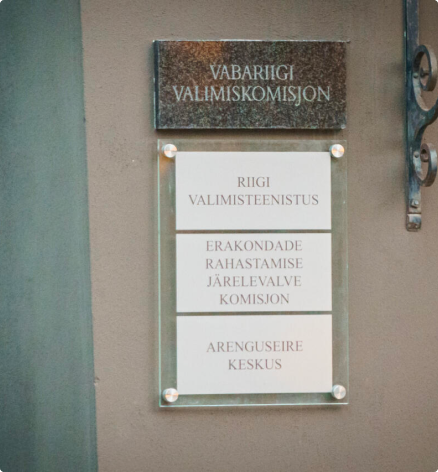Eraknodade Rahastamise Järelevalve Komisjoni avaleht
EUROPEAN PARLIAMENT elections 9 June 2024 - the deadline for submission of the election campaign report is 8 July 2024
Financial activities of political parties
Pursuant to the Political Parties Act, a political party may receive income from the following sources: allocations from the state budget, donations of natural persons, membership fees, and transactions with the property of the political party. The diagram shows the total annual revenue of each political party by types of revenue. If you move the cursor on the bar, the information displaying the financial volume of each type of revenue and its percentage in the total income of the political party will be opened.
See reports on revenuesThe Political Parties Act obliges the political parties to report their expenses, dividing them into three categories: expenses of political activities, labour expenses and administrative expenses (the expenses of political activities are further categorised, but the graph does not cover that). The diagram shows the total annual expenditure of each political party by types of expenses. If you move the cursor on the bar, the information displaying the financial volume of each type of expenses and its percentage in the total expenditure of the political party will be opened.
See reports on expensesA political party declares its revenues, including the donations made to them, on a quarterly basis. The diagram shows the donations made to political parties in calendar quarters. Election events since the local government elections of 2013 are marked on the time axis of the line chart. When you move on the time axis, you can follow the impact of election events on the amount of donations.
See reports on donationsA political party declares its expenses, including the expenses of political activities, on a quarterly basis. The diagram shows the expenses of political activities of political parties in calendar quarters. Election events since the local government elections of 2013 are marked on the time axis of the line chart. When you move on the time axis, you can follow the impact of election events on the amount of expenses relating to political activities.
See reports on financingAbout Committee
The Political Party Funding Supervision Committee was founded under the Political Parties Act in May 2011. The Committee supervises the legality of obtaining and spending the finances of political parties, and also election coalitions and independent candidates who participate in elections, and the observing of other rules proceeding from the Political Parties Act.
The Committe consists of members appointed by the political parties represented in the Riigikogu and representatives of the Chancellor of Justice, the Auditor General and the National Electoral Committee. Members of the Committee are independent, they do not represent the interests and positions of the organisations that appointed them in their work.
The main tool of the Committee is the financial reporting information system, through which the reports on the finances of political parties are collected and published reliably and in a comparable format.


